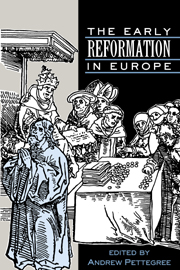3 - Hungary.
Published online by Cambridge University Press: 06 January 2010
Summary
The crucial event for Hungary's early Reformation, indeed for its whole history, occurred some nine years after Luther's protest first ignited the Reformation. On 29 August 1526, near Mohács, in south-western Hungary, the army of Louis Jagiello, the twenty-year-old King of Bohemia and Hungary, confronted what appeared to be a modest detachment of Turks. Some magnates advised the king to withdraw. Several bishops urged him to attack. They argued that Suleiman's main army was some distance away and, moreover, ‘God willed a Magyar victory’. The king ordered the charge. By five o'clock the battle was over. The small contingent of Turks had been joined by the Sultan's army of nearly two hundred thousand. Strewn across the battlefield were the wounded and the dead, among them the King, the archbishops of Esztergom and Kalocsa, five bishops, twenty-eight magnates, five hundred nobles and sixteen thousand troops; more than three-quarters of the Hungarian army.
Mohács was a disaster for the Hungarians. But it also changed the political and military balance in east Central Europe. With the death of Louis, the crowns of Saint Stephen (Hungary) and Saint Vaclav (Bohemia) were claimed by the Habsburg Archduke of Austria, Ferdinand, born and raised in Spain. In accord with the treaties of Bratislava (1491) and of Vienna (1515) Ferdinand had married Anna, the sister of Louis, while his sister, Mary, had wed the Hungarian king. Ferdinand was thus able to claim the crowns of Hungary and Bohemia by right of inheritance and alliance.
His claim, however, did not go uncontested. In both Hungary and Bohemia, the principle of royal election was vigorously maintained by the diets in which many nobles opposed the Habsburg claims.
- Type
- Chapter
- Information
- The Early Reformation in Europe , pp. 49 - 69Publisher: Cambridge University PressPrint publication year: 1992



